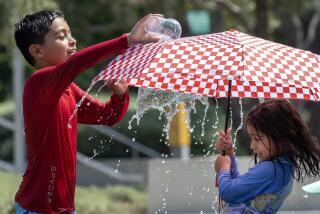HOTLANTA : Officials Sweat It Out as Even the Army Is Being Called Out to Beat the Heat
- Share via
ATLANTA — In 1732, in an attempt to lure the world to the colony he founded, James Edward Oglethorpe described Georgia as “always serene, pleasant and temperate, never subject to excessive heat or cold, nor to sudden changes; the winter is regular and short, and the summer cool’d with refreshing breezes.”
Two hundred fifty-eight years later, in an attempt to lure the world to Atlanta for the Summer Olympics, Billy Payne assured the International Olympic Committee in 1990 that the average temperature between July 19 and Aug. 4 in 1996 would be about 72 degrees. He did not mention that those days would be “cool’d with refreshing breezes.” It was not necessary. The IOC was sold, awarding the Centennial Games to Atlanta over Athens, Greece.
Payne, president of the praying-to-break-even Atlanta Committee for the Olympic Games (ACOG), also predicted a sizable profit. So perhaps he was not trying to mislead the IOC. Perhaps he is simply bad with numbers.
In either case, National Weather Service officials confirm that the average temperature in Atlanta for the days of the Games is 70. That, however, is the low. The mercury stays there for about seven minutes, when most people are sleeping. The average high, they say, is 91.
Last summer, the average high during the 17 days of the Games was 97. With the humidity, the heat index topped 100 in the middle of the day almost every day. It was so brutal that ACOG officials canceled the final day of a venue tour for foreign journalists. The National Weather Service predicts a 37.3% chance that it will be that warm again this year.
But who needs meteorologists to forecast the weather in Atlanta? The city might be called Hotlanta because that is where the action is in the Deep South, but that nickname also could apply to the summer climate.
How hot is it?
“The Sweatlanta Olympics,” says the Economist. “It was not exactly chilly in Barcelona . . . or in Los Angeles in 1984, but Atlanta’s could be the most grueling Games ever.”
”. . . A temple-thumping, polluted, humid heat that saps your energy,” says the Times of London.
”. . . Soaked-shirt, parched-tongue, fry-an-egg-on-the-sidewalk hot,” says the Associated Press.
”. . . Bad for spectators and hell on earth for competitors,” says Sports Illustrated.
Even Payne now acknowledges that the weather is ACOG’s No. 1 villain.
Now that we have established that Atlanta is a hot spot, the question is what officials plan to do about it.
IOC President Juan Antonio Samaranch said he believes he will be OK. “Maybe I will not wear a tie,” he said. But he has concerns that were passed along last month to ACOG about the athletes, spectators and even the high-tech scoreboards at the outdoor venues.
Responding that the organizing committee is ready for the challenge, ACOG spokeswoman Laurie Olsen said, “Between the city, country, state and a host of community groups, Atlanta is mounting an unprecedented effort.”
They are, literally, calling out the Army. The Defense Department is involved. So is the Salvation Army. And Red Cross and Blue Cross. If all else fails, they have asked for help from above. Twenty churches will be open at all times to provide air-conditioned shelter and water for visitors who have come to watch the Games, and even wayward marathoners.
That will not be an option for four-legged athletes, the horses in equestrian and modern pentathlon events. But they have not been forgotten. Animal rights activists raised concerns about the horses before anyone began talking about potential risks for two-legged athletes.
“We think we have done a tremendous amount of work to watch the only athletes in the Games who cannot say, ‘Stop,’ ” veterinarian Kent Allen said during an ACOG media seminar on the heat here last week. “But we do not intend to let these athletes run until exhaustion.”
After four years and $1 million in expenditures on a project to protect the horses, ACOG installed high-powered water mist fans at the site of the equestrian competitions, the Georgia International Horse Park in Conyers, Ga., lengthened rest periods and shortened courses.
They could not do the same thing for human athletes, but the men’s marathon was rescheduled from its traditional starting time, in the late afternoon so that it can conclude during the closing ceremony, to 7 a.m.
Many well-conditioned athletes might not be able to take the heat, especially in endurance events. Records in sports that require more than 15 or 20 minutes to complete are safe, Phil Sparling, a Georgia Institute of Technology exercise researcher told the seminar.
In late May, Adam Johnson withdrew from the final of a Miller Lite/AVP beach volleyball tournament at Atlanta because of heat prostration after the temperature soared into the 90s. At a track and field meet the previous weekend, Algerian miler Noureddine Morceli found the conditions so draining that he announced he would immediately move his headquarters from Albuquerque to Florida to prepare for the heat and humidity. As many as 2,000 athletes have been training in the Southeast for the same reason.
Archer Judi Adams of Phoenix believes some foreign athletes will not be able to adjust. “I know the Europeans don’t take to the heat,” she said. “They don’t usually drink water that much, so the weather will be a real challenge to them.”
Bengt Lager, a former Swedish modern pentathlete who has lived in Atlanta for five years, said that if the heat does not get athletes, the air-conditioning in all the indoor venues will.
“You go from the heat right into the cold,” he said. “If you’re sweating and sit too long in the air conditioning, it feels freezing. It’s an educational thing. You just don’t do it, even if it feels nice. You keep a sweater and a jacket.”
But at least athletes are in training. That is not the case for most spectators. At the recent 10-day track and field trials, when the temperature often was in the low 90s even in the early evening, 20% of the 283 fans who needed medical assistance had heat-related illnesses. Officials fear the percentage will increase during the Olympics, when spectators might have to walk several miles a day to events because access to venues by cars and buses will be limited.
“An elite athlete is a lot more prepared than the average blob who’s a spectator,” Dr. David E. Martin, a professor of cardiopulmonary care sciences at Georgia State University told the AP. “The spectators, in their own way, need to pretend they are Olympians and prepare. They need to start practicing walking three or four miles a day.”
With the tickets, ACOG mailed pamphlets prepared by Blue Cross-Blue Shield including tips to beat the heat. Included: Drink plenty of of water; wear light clothing, a wide-brimmed hat and sunglasses; limit direct exposure to the sun between 10 a.m. and 4 p.m.; use sunscreen; avoid excessive physical exertion; take periodic rest breaks. Also, limit alcohol consumption. No mint juleps.
Aware, however, that most spectators will not take the precautions, 16 public and private agencies are coming to the rescue. The Red Cross is setting up eight tents near the venues with free water, sponges and mist-blowing fans. The Defense Department is providing “water buffaloes,” big tanks usually more associated with fires than drinking water. The Salvation Army is organizing the churches.
The official bottled water, Crystal Springs of Atlanta, is supplying 4 million gallons of water, enough to fill 72 Olympic-sized swimming pools, to athletes and spectators. Teams of Rollerblading, toga-clad “Heatbusters” carrying four-gallon water tanks on their backs will tour high-traffic areas and spray spectators for free.
An act of God also is a possibility, although perhaps not a relief. On the day before the track and field trials, a thunderstorm bringing winds gusting at 43 mph and 1 1/2 inches of rain--another charming feature of Atlanta summers--blew through the city, knocking over a tent and slightly injuring four persons at the Centennial Olympic Stadium, shutting down the rapid transportation system for 12 minutes and temporarily knocking out 911 emergency service.
(BEGIN TEXT OF INFOBOX / INFOGRAPHIC)
Too Hot To Handle?
If current weather patterns in the southeastern United States hold through early August, temperatures during the 1996 Summer Olympics may be among the highest ever. The Southeast, not known for temperate summer weather, is influenced by an area of high pressure known as the Bermuda High. Events will also be held in different cities outside Atlanta, including Athens and Savannah. Each city is affected by distinct weather characteristics due to local topography. A look at what athletes and fans can expect during the XXVI Olympiad:
The Impending Scorch
The National Weather service predicts that area temperatures may soar above record highs during the Olympics. A look at the average of record highs, from July 20 to August 4, for host cities:
Atlanta
Downtown Atlanta’s concrete streets and buildings hold heat, a phenomena called “urban heat island.” Expect outdoor stadium temperatures to be 10 to 15 degrees hotter than events held in suburban areas.
Average record high: 100.2 degrees
Record highs range from 98 to 103 degrees
*
Savannah
Proximity to Atlantic Ocean moderates temperatures but increases humidity. Site of yachting events.
Average record high: 101.8 degrees
Record highs range from 99 to 105 degrees
*
Athens
Located in hilly Piedmont Plateau, moderate weather influenced by southern Appalachian Mountains, Atlantic Ocean and Gulf of Mexico. Site of soccer semifinals and final.
Average record high: 102.5
Record highs range from 99 to 108 degrees
*
Chattanooga, Tenn.
Deep valleys and high ridges create varying winds and temperatures. Canoe and kayak events will be held on nearby Ocoee River.
Average record high: 101.8 degrees
Record highs range from 98 to 106 degrees
*
Columbus
Effects of terrain on weather is neglible; city is hottest and most humid in July. Site of softball.
Average record high: 101.1 degrees
Record highs range from 98 to 104 degrees
Why It’s Hot
Georgia’s weather is influenced by an area of atmospheric pressure known as the Bermuda High which pulls warm, humid air inland from the Atlantic Ocean and the Gulf of Mexico. The high pressure area, which will begin to diminish in early fall, is typified by mild mornings, warm afternoons with occassional afternoon thunderstorms and fair evenings.
Source: National Oceanic and Atmospheric Administration, 1996 Summer Olympic Games Committee and National Weather Service; Researched by APRIL JACKSON / Los Angeles Times
Countdown to Atlanta
* MIKE DOWNEY
With addition of Gary Payton, Dream Team might need diplomatic immunity. C3
* BASEBALL
This could be the last Games featuring an all-college team from the United States. C3
* OLYMPIC SCENE
A legal splash is embarrassing to U.S. swimmer Greg Burgess. C3
* GYMNASTICS
Mihai Bagiu hits the jackpot on the high bar and lands a spot on the U.S. team. C11
* SWIMMING
South African Peter Williams is making a case for a trip to Atlanta. C11
More to Read
Go beyond the scoreboard
Get the latest on L.A.'s teams in the daily Sports Report newsletter.
You may occasionally receive promotional content from the Los Angeles Times.






